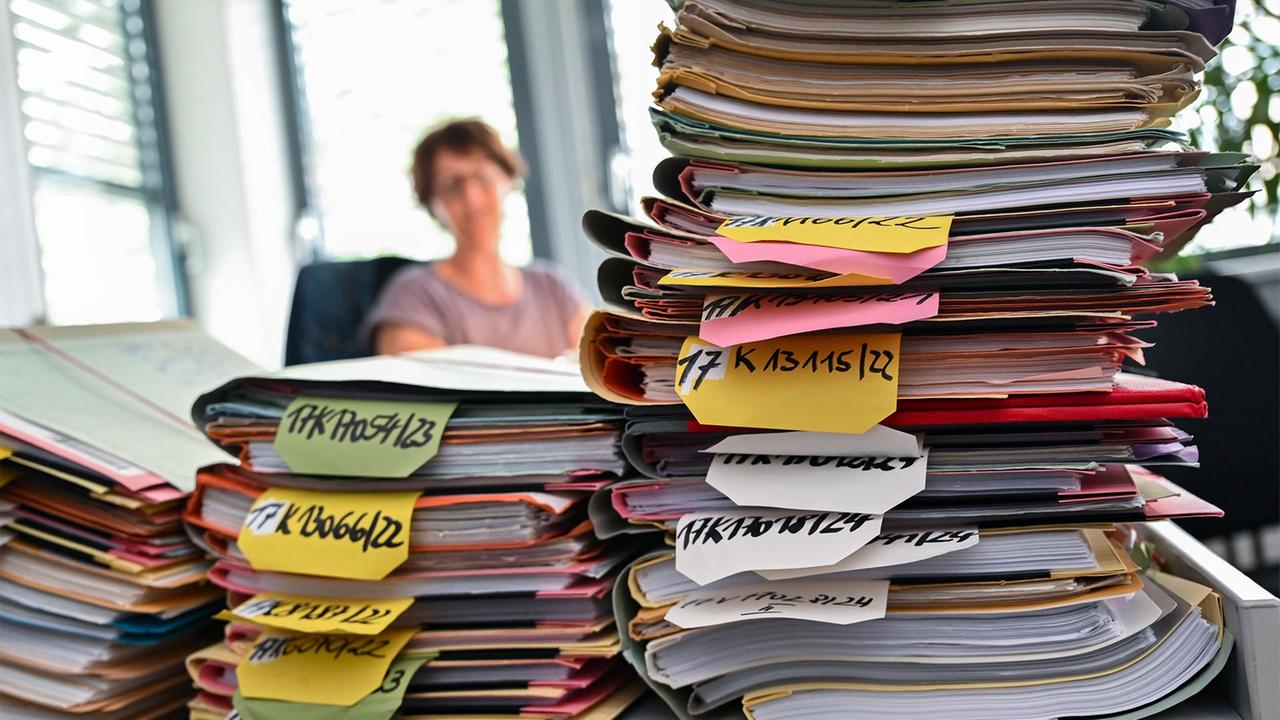Whether it's vehicle registration or the tax office: Germany is lagging behind its own goals when it comes to digitizing administrations. There is no improvement in sight. India could be a possible role model.
Carina Lecking spends most of her days in the office typing numbers – page by page, from paper to the computer. The tax specialist works in the Tauberbischofsheim tax office in Baden-Württemberg. She is always called into action when taxpayers move to or from other federal states. Then a “handover” is due.
“To do this, we first have to contact the receiving tax office and establish their willingness to take over. Then they give us a tax number,” says their boss, Simon Veser. Since there are no permanent, uniform tax numbers in Germany, each tax office issues a new one when it takes over a taxpayer. Then all the documents are collected together in all departments of the transferring tax office: from the cash desk, the payroll and sales tax departments. Most of them are only available digitally. For the handover, they are printed out, put in thick envelopes and sent.
Control systems are not compatible
Once the file has arrived at the new tax office, it is not scanned but typed in. The tax case is “reconstructed”, as the tax office puts it. A task that is carried out by qualified tax officials like Lecking – every incorrectly entered number could cause unforeseeable problems.
All of this takes time: for an average taxpayer, it takes a total of 20 working hours. The file is not available for three weeks, the taxpayer cannot submit any applications and does not receive any payments if they are entitled to them.
This is not only happening in Tauberbischofsheim, but in all German tax offices. The nationwide ELSTER system, which allows taxpayers to submit their returns online, has been in place since 2001. But behind it, each federal state continues to work independently. The systems are not compatible. “Within Baden-Württemberg, we can submit the case with just a few clicks, without a file and without paper,” says tax office head Simon Veser, “but this is not yet the case in other federal states. However, work is being done on it.”
And that has been the case since 1991. Since then, the federal and state governments have wanted to standardize the tax office systems. More than two billion euros have been invested. But experts now expect that the transfer of tax files to other federal states will not be possible until 2029. The Federal Ministry of Finance refers to the responsibility of the states. North Rhine-Westphalia is in charge of the tax office software. Despite several inquiries from the ARD magazine plusminus there is no answer from there.
Vehicle registration often does not work online
The tax offices are not the only construction site. Digitization is stalling everywhere, including when it comes to vehicle registration. The i-Kfz, the online registration process for vehicles, should have been in operation nationwide since the end of 2023. But it does not work in 50 districts and independent cities, including large cities such as Bremen, Gelsenkirchen, Lübeck, Magdeburg and Rostock.
This is a problem for fleet manager Sheila Schmidt from Team Logistik, a large freight forwarding company near Kiel. “It takes time. We prepare everything, then the registration service drives to the registration office and picks it up again. This can take up to five days.” And it is expensive. The freight forwarding company has almost 500 vehicles. Last year the company moved; just re-registering the tractors and trailers cost 10,000 euros.
“We were told that the interface to the major customer service is not currently working,” says freight forwarding manager Christian Witt, “but we were not told when it would work.” The problem here too: There is no central solution. Each registration office has to install and provide the software for i-KfZ itself.
Municipalities digitize themselves independently
The federal government could have offered vehicle registration centrally for everyone via the Federal Motor Transport Authority. “Citizens don't really care where they register their vehicle. They don't even notice it when they're sitting in front of their laptop,” says Saxony's digital commissioner Thomas Popp. “That's why it's important to set up a uniform procedure if we have federal regulations.”
But that was never planned. A birth defect of the Online Access Act, which the then federal government passed in 2017. The goal: trips to the office should be unnecessary by the end of 2022. Everyone should be able to do everything online. Municipalities and districts are responsible for 85 percent of services – from birth certificates to certificates of good conduct. Because of local self-government, the big nitty-gritty is starting: more than 11,000 municipalities and 300 districts are starting to digitize themselves independently. Instead of setting up a common platform, so-called specialist procedures, i.e. individual services, were digitized individually. There are 30,000 of them.
“It's really scary”
“Back then, I had discussions with municipalities and districts. They definitely didn't want anyone to interfere with their autonomy,” recalls digital consultant Thomas Meuche from Hof University of Applied Sciences. “Now, the smaller communities are praying that someone will offer them a central solution that they can use.”
Digitalization has proven to be difficult and expensive. To date, the goals of the Online Access Act have not been achieved. In Bavaria (45 percent) and Hamburg (48 percent), only just under half of administrative services are available digitally. This is followed by Hesse, Berlin and Thuringia. In the rest of the country, only a third are digitalized, with Brandenburg and Saarland at the bottom with 31 percent. Germany has slopped the digitalization game. Meuche: “We are so far behind on the whole issue that it is now really frightening for me.”
Almost all administrative procedures in India online
India shows how things can be done better. 1.2 billion people here complete almost all administrative procedures by cell phone. The most important app is called Aadhaar, which means foundation in English. It gives everyone a unique ID to identify themselves online. 99 percent of adults have it because there are no alternatives. All services are based on it. “Vehicle registration is done online, you can apply for passports online,” says Shalini Mathur, who is driving digitization at the TCS company in Delhi. “All basic services are online. We don't go to these offices anymore.”
Because the radio networks are well developed, this even works in remote mountain villages. Driver's licenses are now stored digitally on cell phones, as are medical records, tax and social security documents. There is one platform for all authorities – not dozens like in Germany.




